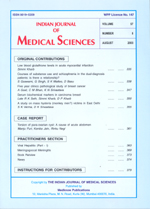
|
Indian Journal of Medical Sciences
Medknow Publications on behalf of Indian Journal of Medical Sciences Trust
ISSN: 0019-5359 EISSN: 1998-3654
Vol. 58, Num. 3, 2004, pp. 132-133
|
Indian Journal of Medical Science Vol. 58 No. 3, March 2004 , pp. 132-133
Letter to Editor
ULTRA-RAPID OPIOID DETOXIFICATION PROCEDURES IN INDIA: HOW
FAR THEY ARE ETHICAL?
Om Prakash Jhirwal, Debasish Basu
Drug De-addiction & Treatment Centre, Department of Psychiatry,
Postgraduate Institute of Medical Education & Research, Chandigarh - 160012,
India
E-mail: drjhirwalop@yahoo.co.in
Code Number: ms04021
Sir,
During recent years, opiate detoxification procedures have created renewed
interest particularly in field of neuro-biological mechanisms and the new
pharmacological approaches to opiate dependence.1
Ultra-rapid detoxification (URD) emerged in the mid-1990's2 and
attracted the attention of both media and clinicians. URD, also known as anesthesia-assisted
opiate detoxification, is a procedure for detoxifying opioid-dependent patients
with opiate antagonists, such as naloxone/naltrexone.3 While under
deep sedation, opiate antagonists are administered to the patient as well as
symptom-relieving medications in some cases. Patients are examined and prepared
for the procedure for 4 to 6 hours. They then undergo URD
procedure for 5 to 8 hours. After
this procedure, patients are kept in the hospital
for next 12 to 24 hours for observation. Claims have been made for its efficacy
as a
complete cure for opiate addiction.4
In India, these detoxification procedures are the object of
increasing controversy and are becoming increasingly common among private clinicians
and their de-addiction facilities. Most opiate addicts seeking treatment in
India are served by the public sector. A wide range of treatment approaches
are available, including supportive local social services, public and private
detoxification centers, therapeutic communities, and local self-help groups.
URD was introduced in India by private sector de-addiction
facilities. These facilities claim in media that URD provides 100 percent success
results in opiate addicts without any conscious suffering. This conveys a misconception
to the addict that there is a quick, easy, and sure method to come out from
dependency. Clearly, this approach contradicts the traditional view of dependency
as a bio-psycho-social problem that requires an intensive and comprehensive
management for achieving long-term abstinence. It is seen from day to day clinical
practice that many URD clients subsequently requested treatment in the public
system. Similar doubts were raised by research workers in Western countries
who were skeptical of any method claiming "cure" via a simple, short,
and uni-dimensional approach. They believe that detoxification and medication
alone cannot provide long-term abstinence. Some scientific studies also claim
that URD may be much less effective and more expensive than traditional treatment3 which
further challenges its feasibility in
developing countries.
However, much controversy currently surrounds URD because
of its associated risks of mortality and morbidity5 which usually
hided by private de-addiction facilities. There is need of proper psycho-education
among service utilizers and legal authorities must be sensitized regarding
these procedures. It is evident from some clinical studies that no specific
subgroup of clients benefited more from URD. Nevertheless, limited data is
available regarding patient outcome after URD. Finally, one should bear in
mind that detoxification is only the initial step of a prolonged therapeutic
process with biological, psychological, social and environmental aspects that
may influence the final outcome, that is abstinence.
References
- Nutt DJ. Addiction: brain mechanism and their treatment
implications. Lancet 1996;347:31-6.
- Loimer N, Hofmann P, Chaudhry H. Ultrashort non-invasive
opiate detoxification. Am J Psychiatr 1993;150:839.
- Lawental E. Ultra-rapid opiate detoxification as compared
to 30-day in patient detoxification program a retrospective follow-up
study. J Subst abuse 2000;11:173-81.
- Krabbe PF, Laheij RJ, Victor van Cauter RM, de Jong CA.
Rapid detoxification from opioid dependence under general anaesthesia
versus standard methadone tapering: abstinence rates and withdrawal distress
experiences.
Addict Biol 2003;8:351-8.
- Dyer C. Addict died after rapid opiate detoxification.
Br Med J 1998;17:170.
Copyright by The Indian Journal of Medical Sciences
|
